- Home
- Neil Gaiman
Stories Page 14
Stories Read online
Page 14
I was grinning at the people going past. Some glanced at me with worried looks on their faces. Long ago, last week, I would have said that it was because I was a black man, filled with the purpose of my race, but then I thought that they couldn’t possibly understand the experience that flowed in my veins.
The sun was screaming at me and I decided to stand. It was only then that I realized how weak I was. I fell face forward to the pavement. It didn’t hurt because I was unconscious before I hit the ground.
SOMEWHERE THE SUN WAS setting. Its final shout over the horizon was followed by a silence so profound that I was yanked out of sleep, as if someone had dumped a hundred pounds of ice on my bare skin. I leaped up from the hospital bed and gazed out of the window into the burgeoning darkness of twilight.
“What’s wrong with you, guy?” a man said.
I turned to see him. He was one of six other men in beds around the room, a white man with a gray beard and a darker, though still somewhat gray, mustache.
“How did I get here?” I asked.
“They just dragged you in. We thought you was dead.”
I was still dressed. The excitement of the day was replaced by the certainty of night. The thrill that filled me was dark and dangerous.
I was in the street before I realized that I had no shoes on my feet. But I wasn’t bothered by the touch of my skin on the concrete and asphalt.
I headed back to the park. Once there I searched out my prey.
SHE WAS A YOUNG brown-skinned woman walking down a quiet lane. There was no fear emanating from her. I headed in her direction and, while passing, I put an arm around her waist, pulled her to me, and bit, with a lower tooth I’d never had before, into her neck. It was a pinprick, a small wound that would heal quickly. She fought me for all of eight seconds and then I felt her hand caress the back of my neck.
“Who are you?” she whispered. “What are you doing to me?”
Her blood flowed slowly into my mouth. It was the richest, most sumptuous meal I’d ever had. It was steak and butter and thick red wine that gods ate on the high holidays of their divinity.
“Please,” she whispered in a wavering voice. “What’s happening to me? I feel it everywhere,” and she rubbed her body against mine.
I drank more and more.
She told me things in that park while people wandered past thinking that we were lovers who couldn’t wait for closed doors.
As I tasted her rich bounty, she whispered the secrets of her life. Her desires and disappointments, loves and mistakes flowed as her blood. I realized somewhere in the back of my mind that I was somehow feeding on her soul as well as the serum of her life.
This delightful experience lasted for a quarter hour and then suddenly the tooth retracted painfully into my lower gum. I pulled back from her and she reached out for me.
“Who are you?” she asked.
“Juvenal Nyx,” I said.
“What did you do to me?” She brought the fingers of her right hand to her neck.
“It’s a drug.”
“I,” she hesitated, “I want more.”
“Meet me here tomorrow at the same time and I will bring it to you.”
She was about to say something else, but I put a finger to her lips.
“Go,” I said and she obeyed immediately.
I WAS RUNNING THROUGH the park with all the fleet lightness of a young deer or the quick-footed predator on its trail. I was laughing and uncontainable. My first prey would forget me. If she didn’t, if she came back, I would not return to that spot for many weeks. I knew, somehow, that the drug of my bite would turn toxic in her veins if I ever bit her again.
I sped all the way to Harlem, but when I got to the street where Central House stood I balked. For the first time I understood, in my intellect, that things had changed. I had been going on my senses up until that block. But then I realized that I couldn’t just walk into the political commune in bare feet, with blood on my breath.
I went into the alley of the building across the street and scaled the wall with little difficulty. When I reached the rooftop I hunkered down, black skin in gathering darkness, to spy on my friends.
CECIL BONTEMPS AND MINERVA Jenkins walked out of the front door of the house late in the evening. I concentrated on them with all of my senses. They talked about the meeting they’d just quit. It was a summit about me, my disappearance. They mentioned a white girl I was seen leaving with.
“Jimmy was always a flake,” Cecil said. “Prob’ly shacked up and high as a kite with that chick.”
An animal growled and I started, looking around the empty roof. It was only then that I realized the bestial noise had come from the anger in me.
“Jimmy don’t get high,” Minnie said. “You know that. Something’s happened to him. We should do like Troy says and go to the police.”
“We cain’t have the police rummagin’ around Central,” he said. “What if they found our weapons?”
We had been stockpiling rifles and ammunition for the coming revolution. We kept them in a trunk in the basement, ready for the day that martial law was declared on the Black Man.
“We got to do something, Cecil.”
“Okay. Yeah. All right. Let’s go down to that bookstore again.”
I STAYED ON THAT roof for three days eavesdropping on my onetime comrades. In the day, the sun would rise, bellowing across the sky, and I’d fall into a coma after a while. At night I roused and watched my friends as if they were prey.
On the fourth evening I chased a young man down an alley three blocks north of Central House. I yoked him in a doorway and bit into his shoulder. He whimpered and cried as I drank of the serum of his life. It felt uncomfortably sexual. I realized that unless it was necessary, I’d prefer the blood of women.
“What did you do to me?” His speech was slurred, but he was still afraid.
“Go,” I said in a deep voice that was alien to me.
He ran.
I’d forgotten about Central House by that time. For the rest of the night I prowled the streets, looking but not wanting, a danger but not a threat.
At dawn I returned to the Brooklyn warehouse where Julia had taken me. Two floors below the room she’d first taken me to was the tomblike chamber that would be home from then on. She’d left the key to the door in my pocket.
In the darkness, far below the street, I could hear the faraway singing of the sun. I felt safe in my vault—dangerous too.
2.
THAT WAS THIRTY-THREE YEARS ago, October 1976. Since then I’ve inhabited the underground chamber that Julia somehow owned. The title had been signed over to me, and I lived there, sleeping in that bed or sitting on the straight-backed chair, going out now and again for a cupful of blood from some unwary pedestrian. Sometimes I’d bite them just enough to introduce the drug into their system, then use their money to let a hotel room where slowly, over the course of the evening, I would lick their necks and growl like a great wolf.
I have killed no one and discovered many things about my mutation.
One very important detail is that I heal very quickly.
I found this out one evening when a gang of young men decided to attack me and the woman I was feeding on in Prospect Park. There were eight of them, but I was at full strength and so fought them off after some effort. I realized later that I had been stabbed three times in the chest. Certainly my lung was pierced and possibly I’d sustained damage to my heart.
I considered going to the hospital, but something kept me from human company when I was wounded and so I went home to die.
For many days I lay on the floor of my chamber feeling the pain in my chest. But after a week or so I revived enough so that I could go out and feed. Now all that’s left of my fatal wounds are three whitish scars on my chest.
I don’t read books or go to movies, watch television or follow the news. The only human contact I’ve had up until quite recently has been primarily limited to the whispering euphoria of my
victims. I’ve fed every few days or so and have lived on the sustenance of human blood and the soul seepage when they are under my sway. I can sit for days in my underground chamber savoring the soft murmurings of my victims. Their words about secret desires and unfulfilled dreams imbue me with the possibilities of a life that has been denied me. Sometimes I drift for hours in the secrets told me from swooning lips. I can see the images that they remember and feel the emotions they have hidden from everyone else.
For the first few years I only went after women because of the intimate nature of my bite. But as time has gone by I have also preyed upon some men. My taste for blood has been refined and I seek out certain flavors and scents. Some nights I go out and there is no one for me. And though I prefer young women, there are others who demand notice.
I have discovered other things about my nature. I am, for instance, allergic to the full moon. Those nights, if I am exposed to lunar regency, I develop a fever and a headache so powerful that I am blinded by its potency. If I go out in the full moon, I remain incapacitated for over a week.
This is how I found out another quirk in my physical characteristics. When the fever is upon me I am weak, so much so that most normal people can fend off my attack. And because the malady lasts for so long I am further weakened by the subsequent lack of sustenance. In this diminished state I am forced to seek out quarry that is likewise incapacitated.
After the first time I was weakened by the lunar allergy, I came upon an old woman confined to a wheelchair who had been left for a while by an unprofessional attendant. The attendant had gone down to the water not far from my crypt and was talking at a phone booth. While she was there I snuck up behind the old woman and bit.
Her dreams were fragmented and her blood thin, but it was all I could do. I hoped that she would not die from my attack. I find that since my transformation I have an instinctual reverence for life in all its myriad forms. Spiders and roaches, rats and human beings all have a right to life in my eyes. I drank half a dram of the old woman’s tasteless blood and hurried away to revive.
Four weeks later I saw the woman walking with a new nurse. She was healthy for a woman her age and chattering happily with the new helper. I realized then that my bite has certain curative properties. I remember smiling at my elderly prey as I walked past. She looked as if she recognized something about me, though that should have been impossible seeing that I’d attacked her from behind.
ANOTHER PART OF MY life has been the coronas, empty circles of light that are seemingly invisible to the human eye. They come in every color and have a variety of natures. Some are predatory, attacking and destroying others of their kind. Some are able to communicate with me. Not many approve of my being. I don’t know if it is that they don’t want to be seen or if they are repulsed by my urges and needs. Regardless—we exist on different planes and cannot touch or affect each other in any physical way.
The only corona I recognize is the yellow being that approached me while Julia was making me into Juvenal Nyx. It appears to me at times, imparting cryptic messages about knowledge and perception.
“You are on the path to knowing what should be secret,” it has said more than once—not in words but the meaning has crossed the void between us and settled on my mind.
I paid little attention to these messages until nine months ago.
I was down on Water Street watching the old woman who had been wheelchair bound before I bit her. By now she no longer had a nurse and was herself looking after what might have been a toddler grandchild.
I felt paternal toward the old woman and ancient in my bones. It was a summer evening and the sun was far enough behind the horizon that I didn’t have to worry about light-headedness.
“Come,” a voice in my head said.
I turned and saw the jagged yellow corona floating in the air behind me.
I stood to follow, but the strange piping voice then said, “Later.”
“Come later?” I asked the empty air.
The corona disappeared and I went back to my subterranean home to wait for it to reappear. I had eaten quite recently and so had no need to hunt.
Late that night the yellow light appeared in my chamber. It did not speak but led the way up and out of my home. It brought me to the pedestrian entrance of the Brooklyn Bridge and faded from sight.
I walked out on the pathway. It was late in the evening and unseasonably cool, so I was one of the few people out strolling. When I had just passed the first pylon of the bridge, I caught sight of a woman who had climbed out on a girder and was now about to jump.
My condition makes me quite agile and strong. I ran straight out across the girder and caught the woman by her wrist just as she was falling over the side. I pulled her up and held her around the waist in case she wanted to try again.
“This is not a good idea,” I said. My voice was dry and cracked, as I rarely spoke out loud.
“What’s wrong with your eyes?” she replied.
For some reason this made me smile.
“You were going to kill yourself,” I said.
“That’s not going to happen now,” she said, “obviously.” She looked back over the side a little wistfully. “You want to buy me some coffee?”
HER NAME WAS IRIDIA Lamone. She’d been born and raised in northern California and had come to New York to study painting.
“I married my high school boyfriend, but we don’t really get along anymore,” she told me at the Telltale Bean in Brooklyn Heights.
There was no hint in her demeanor that she’d just tried to kill herself.
My senses were in such a heightened state from the corona and saving a life that it took me a while to identify the potency of her scent. There was a bouquet to her blood that I had never experienced before. It drew me on a primal level. I found myself having to hold back from biting her right there in the coffee shop.
“Is that why you tried to kill yourself?” I asked.
“Tarver is always depressed,” she said. “He mopes around the house when he’s not working and he’s jealous of my painting. Whenever I’m working he finds some way to interfere. Either he needs my attention or finds something wrong with the house. He comes in with plumbing problems and unpaid bills—anything to distract me, anything so he doesn’t have to feel bad about me living my life.”
“That’s not really an answer,” I said.
“I don’t owe you an answer, Juvenal. What kind of name is that anyway?”
“I was very sick once,” I said. “A woman saved my life and after that she suggested that I go by the name Juvenal Nyx.”
“Why?”
“It means ‘child of the night.’”
“It’s like you were named after a poem.”
“The disease left me with certain allergies to natural light. If I go out in the sun, I get weak. If I stay out long enough, I lose consciousness.”
“And do you get a rash?” she asked. She was smiling, less than an hour out from her attempted suicide.
“No, but I get a kind of allergy to bright moonlight too.”
“Wow. And you call this better?”
“It is best. I know the parameters of my existence and experience ecstasy every night.”
This was true though I had never spoken it. I wasn’t cursed or debilitated. I didn’t miss my family or friends. The life I had known decades before seemed to me like a rat trapped in a researcher’s maze. My sex, my race, my repetitious existence—these were the chains of mortality, the bonds that I had shrugged.
“Ecstasy?” she uttered.
The look in her eyes told me that I loved her. The scent on her breath was the odor of procreation.
“Why did you try to jump?” I asked.
“It just all came together,” she said in a matter-of-fact tone. “I didn’t want to go home to Tarver and I was sure that I’d never paint again.”
“Why not just leave him?”
“Because that would kill him and then I’d have his death
on my head.”
“And so you’ll do it again?”
“I don’t think so,” she mused.
Iridia had dark bronze skin and large almond-shaped eyes. Her gold-brown hair was long and thick, tied back into a braid that was reminiscent of a broad rope.
“Why not?” I asked.
“Because I believe in fate and you saved me at the last possible moment, when I had given up.”
“Because I saved you, you won’t try to kill yourself again?”
“Not just because you saved me,” she said. She reached across the table and took my cold hand in hers. “I had already jumped. I could feel the gravity give way beneath me. I had given myself up to death and then you caught me and held me.”
We gazed into each other’s eyes and I was lost.
“Would you ever give up the sun?” I asked.
“Never,” she said. “I’m a watercolorist and I need it to feed my heart.”
“But you were willing to die,” I argued.
“Not anymore.”
It was at that moment I came into control of my life. All that had gone before was immediately obvious and clear. I had existed as human being for twenty-two years following the pathways that were prescribed. I had a race and gender, nationality and language. I was what the world made me. And then, when Julia came, I was what she made me. So tenuous was my existence that the transformation she wrought tore apart the paper-thin fabric of my identity. I hadn’t even been able to maintain my name. I had, for fifty—five years, never made a choice on my own. I was always led, always formed by others’ hands. Even my school politics came from a knee-jerk desire to belong.
Iridia had found her identity with a simple gesture, had changed her direction when she saw a new light.
“Will you come home with me tonight?” I asked.
“But I have to go back to Tarver in the morning.”
“All right.”
I WANTED MORE THAN anything to bite Iridia, to change her from human being to predator child. The fang in my lower jaw throbbed as we kissed, as we made love, but I would not bring it out.

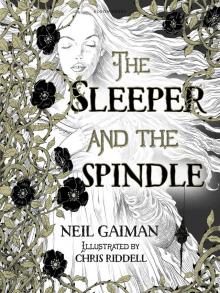 The Sleeper and the Spindle
The Sleeper and the Spindle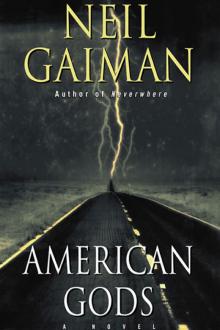 American Gods
American Gods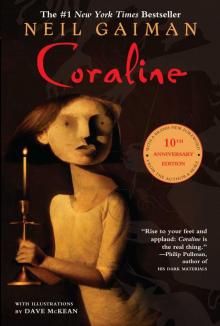 Coraline
Coraline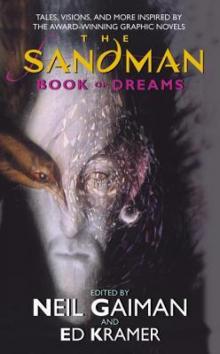 The Sandman: Book of Dreams
The Sandman: Book of Dreams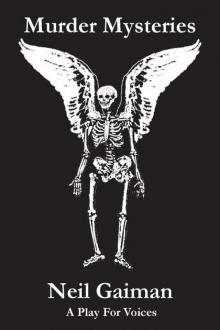 Murder Mysteries
Murder Mysteries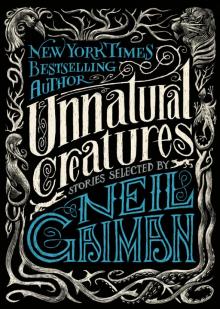 Unnatural Creatures
Unnatural Creatures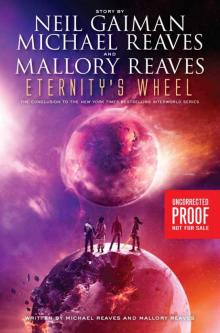 Eternity's Wheel
Eternity's Wheel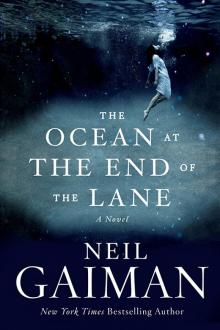 The Ocean at the End of the Lane
The Ocean at the End of the Lane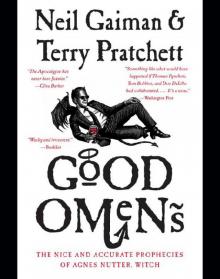 Good Omens
Good Omens Stardust
Stardust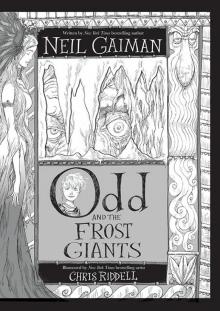 Odd and the Frost Giants
Odd and the Frost Giants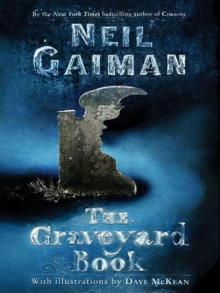 The Graveyard Book
The Graveyard Book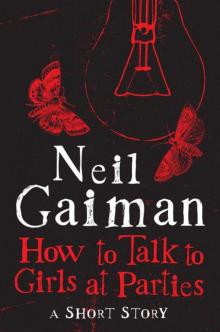 How to Talk to Girls at Parties
How to Talk to Girls at Parties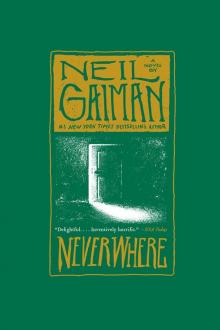 Neverwhere
Neverwhere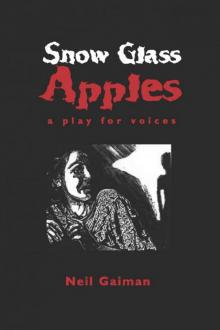 Snow, Glass, Apples
Snow, Glass, Apples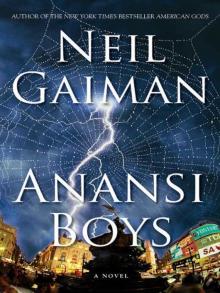 Anansi Boys
Anansi Boys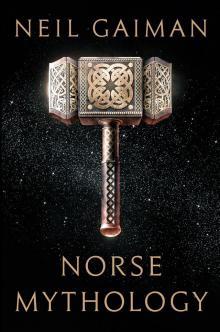 Norse Mythology
Norse Mythology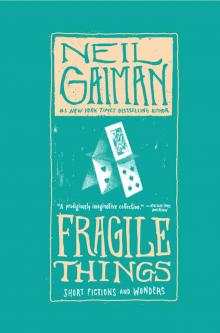 Fragile Things: Short Fictions and Wonders
Fragile Things: Short Fictions and Wonders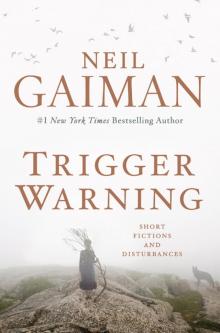 Trigger Warning: Short Fictions and Disturbances
Trigger Warning: Short Fictions and Disturbances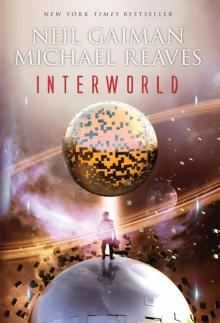 InterWorld
InterWorld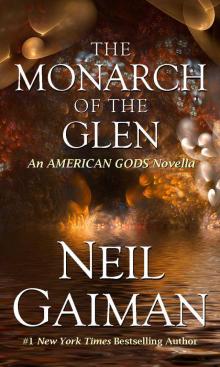 The Monarch of the Glen
The Monarch of the Glen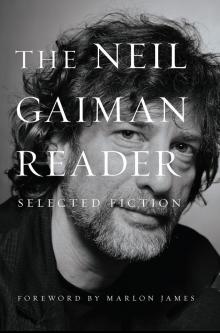 The Neil Gaiman Reader
The Neil Gaiman Reader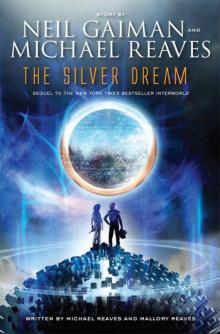 The Silver Dream
The Silver Dream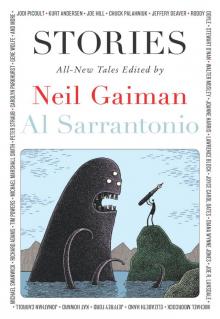 Stories
Stories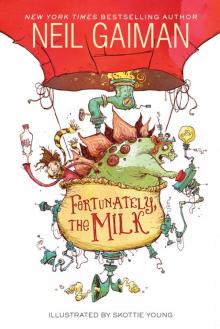 Fortunately, the Milk
Fortunately, the Milk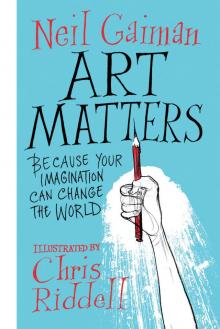 Art Matters
Art Matters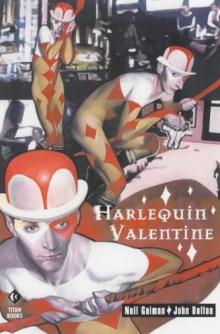 Harlequin Valentine
Harlequin Valentine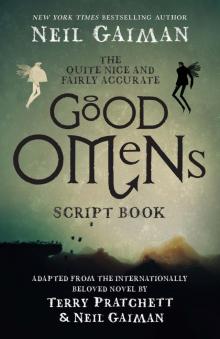 The Quite Nice and Fairly Accurate Good Omens Script Book
The Quite Nice and Fairly Accurate Good Omens Script Book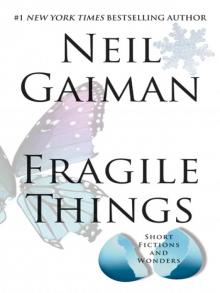 Fragile Things
Fragile Things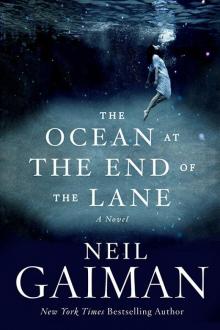 The Ocean at the End of the Lane: A Novel
The Ocean at the End of the Lane: A Novel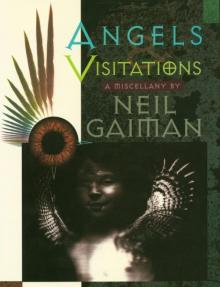 Angels and Visitations
Angels and Visitations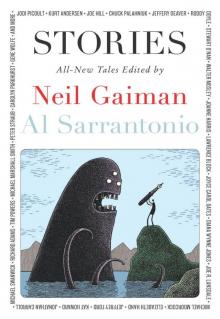 Stories: All-New Tales ngss-1
Stories: All-New Tales ngss-1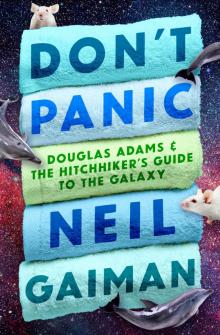 Don't Panic
Don't Panic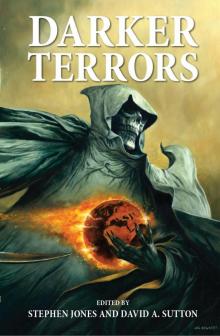 Darker Terrors
Darker Terrors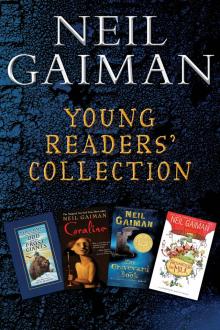 Neil Gaiman Young Readers' Collection
Neil Gaiman Young Readers' Collection A Study In Emerald
A Study In Emerald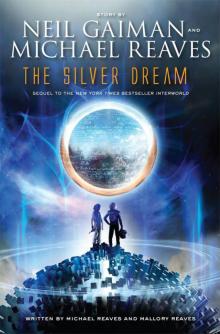 The Silver Dream: An InterWorld Novel
The Silver Dream: An InterWorld Novel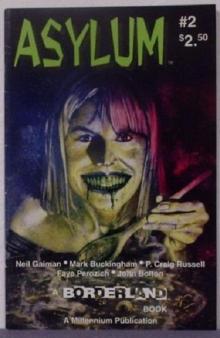 Feeders and Eaters
Feeders and Eaters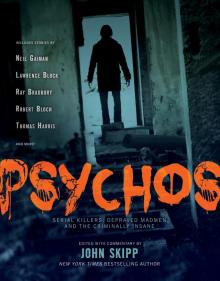 Psychos
Psychos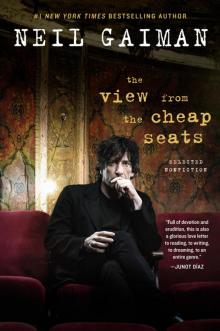 The View from the Cheap Seats
The View from the Cheap Seats Trigger Warning
Trigger Warning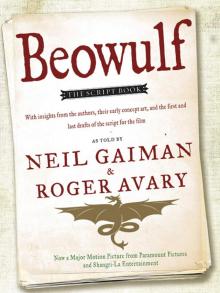 Beowulf
Beowulf Nessun Dove
Nessun Dove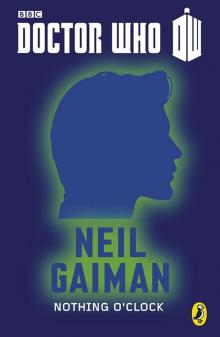 Doctor Who: Nothing O'Clock: Eleventh Doctor: 50th Anniversary
Doctor Who: Nothing O'Clock: Eleventh Doctor: 50th Anniversary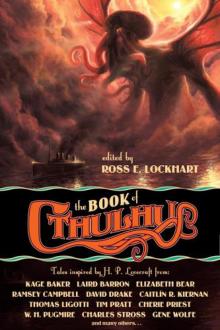 The Book of Cthulhu
The Book of Cthulhu